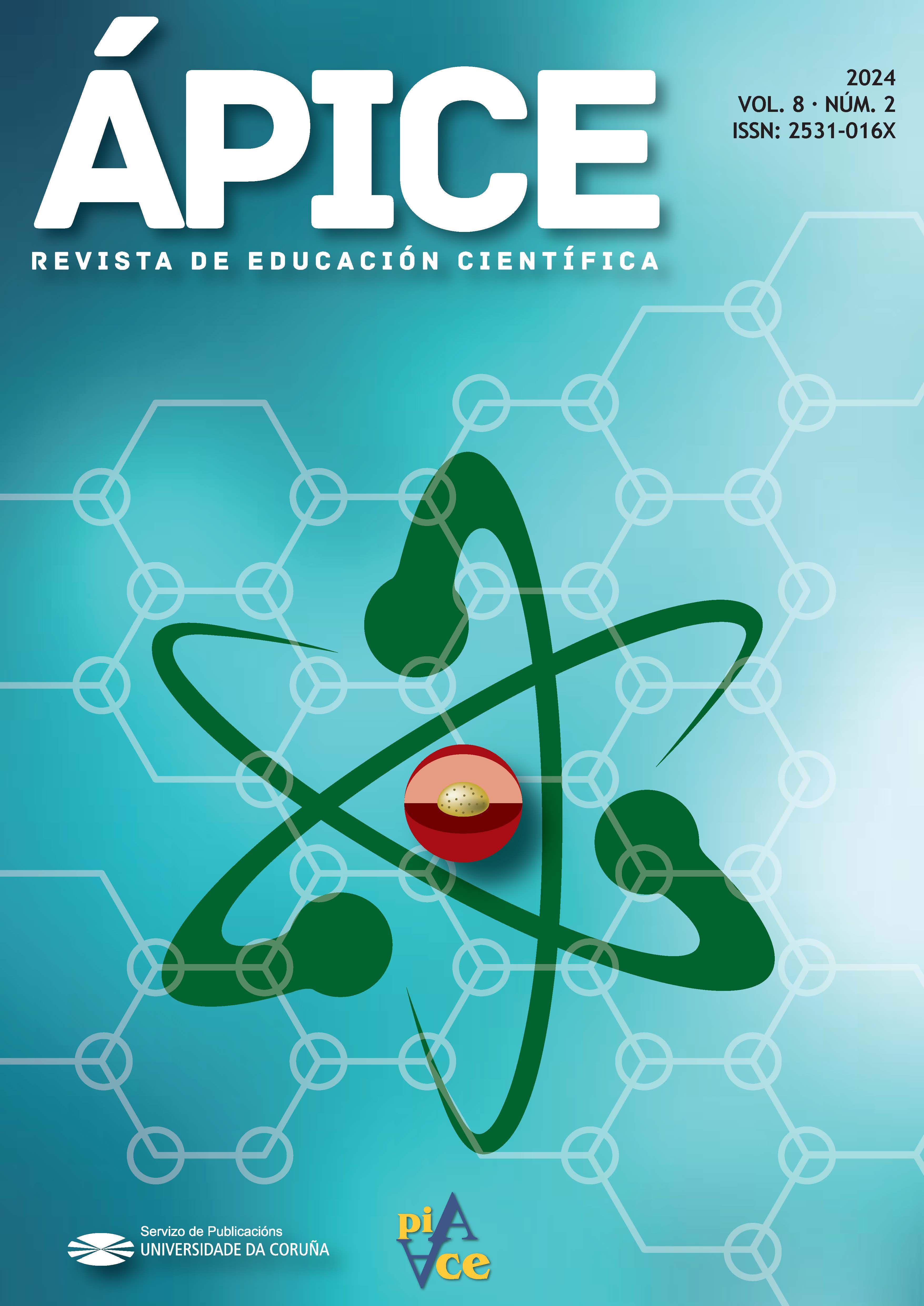Early childhood education teacher interest in the UManresa Lab 0_6 free-choice science space
Main Article Content
Abstract
Free-choice science spaces for early childhood education have been shown to play a key role in the development of enquiry skills among young children. However, little research has been conducted into interest in such spaces among early childhood education teachers. The aim of this study is to examine interest in and satisfaction with inclusive, free-choice science spaces among early childhood education teachers based on participation and satisfaction data from Lab 0_6 activities at UManresa. The results show a significant increase in participants and interest in the Lab 0_6 pedagogical space at UManresa since its creation in January 2016, thus confirming the value of science spaces in early childhood and the need for more research about their contribution to children’s learning.
Keywords:
Downloads
Article Details
References
Aguilera Morales, D., Santamaría-Cárdaba, N., y Jacobo, Z. (2023). Avances hacia una enseñanza inclusiva de las ciencias. Una revisión sistemática. En Soñar grande es soñar juntas. En busca de una educación crítica e inclusiva (pp. 836-851). Octaedro.
Ardoin, N. M., y Bowers, A. W. (2020). Early childhood environmental education: A systematic review of the research literature. Educational Research Review, 31, 100353. DOI: https://doi.org/10.1016/j.edurev.2020.100353 DOI: https://doi.org/10.1016/j.edurev.2020.100353
Bodrova, E. (2008). Make-believe play versus academic skills: A Vygotskian approach to today’s dilemma of early childhood education. European Early Childhood Education Research Journal, 16(3), 357-369. DOI: https://doi.org/10.1080/13502930802291777 DOI: https://doi.org/10.1080/13502930802291777
Brauns, S., y Abels, S. (2021). Validation and Revision of the Framework for Inclusive Science Education, Working Paper No. 1/2021. Leuphana University Lüneburg, Science Education, 1/2021, 1-31. Recuperado de: https://www.leuphana.de/institute/insc/didaktik-der-naturwissenschaften/publikationen/inclusive-science-education/the-framework-for-inclusive-science-education-working-paper-01-2021.html
Bueno, D. (2017). Neurociencia para educadores. Todo lo que los educadores siempre han querido saber sobre el cerebro. Octaedro/ Rosa Sensat.
Carballo-Márquez, A. (2016). Neuroeducació: De la neurociència a l’aula. Guix d’infantil, 85, 11-14.
Cruz-Guzmán, M., Puig, M., y García-Carmona, A. (2020). ¿Qué tipos de actividades diseñan e implementan en el aula futuros docentes de Educación Infantil cuando enseñan ciencia mediante rincones de trabajo? Enseñanza de las ciencias : revista de investigación y experiencias didácticas, 1, 27-45. DOI: https://doi.org/10.5565/rev/ensciencias.2698 DOI: https://doi.org/10.5565/rev/ensciencias.2698
Dawson, E. (2014). Equity in informal science education: Developing an access and equity framework for science museums and science centres. Studies in Science Education, 50(2), 209-247. DOI: https://doi.org/10.1080/03057267.2014.957558 DOI: https://doi.org/10.1080/03057267.2014.957558
Glockengiesser, I., Lemkow-Tovias, G., Lefterov, P., Rosiers, M., Scheer, S., Piovano, C., Krulis, A.-M., Wildenberg, M., Sort García, M. L., Orban, K., y Mateeva, A. (2023). White book on Inclusive Science Education. European Comission.
Gómez-Motilla, C., y Ruiz-Gallardo, J. R. (2016). El rincón de la ciencia y la actitud hacia las ciencias en educación infantil. Revista Eureka sobre Enseñanza y Divulgación de las Ciencias, 13(3), 643-666. DOI: https://doi.org/10.25267/Rev_Eureka_ensen_divulg_cienc.2016.v13.i3.10 DOI: https://doi.org/10.25267/Rev_Eureka_ensen_divulg_cienc.2016.v13.i3.10
Gopnik, A. (2012). Scientific Thinking in Young Children: Theoretical Advances, Empirical Research, and Policy Implications. Science, 337, 1623-1627. DOI: https://doi.org/10.1126/science.1223416 DOI: https://doi.org/10.1126/science.1223416
Haldón, J., Pedreira, M., y Lemkow-Tovias, G. (2022). Propuesta de análisis de la intervención de la persona adulta en un espacio de ciencia de libre elección. Enseñanza de las Ciencias. Revista de investigación y experiencias didácticas, 40(3), 109-123. DOI: https://doi.org/10.5565/rev/ensciencias.5505 DOI: https://doi.org/10.5565/rev/ensciencias.5505
Kuhn, D. (2012). Enseñar a pensar. Amorrortu editores.
Lemkow-Tovias, G., y Oliveros Masakoy, C. (2022). Educación científica inclusiva desde la primera infancia. Aula de infantil, 114, 9-12.
Mateo-González, E., y Sáez-Bondía, M. J. (2022). Experimentar con minerales en Educación Infantil: Evaluación de un espacio de Ciencia de libre elección. Revista Eureka sobre Enseñanza y Divulgación de las Ciencias, 19(2), 1-22. DOI: https://doi.org/10.25267/Rev_Eureka_ensen_divulg_cienc.2022.v19.i2.2801 DOI: https://doi.org/10.25267/Rev_Eureka_ensen_divulg_cienc.2022.v19.i2.2801
Pedreira, M. (2022). Escutar a realidade, dialogar com o meio. En Remando contra a maré (pp. 227-242). Phorte editora.
Pedreira, M. (coord). (2019). Ciencia en la primera infancia. 49+1 propuestas en libre elección. Graó.
Pedreira, M., y Lemkow-Tovías, G. (2021). L’educazione scientifica di qualità nella prima infanzia: Un cammino verso l’equità? En Qualità e equità nell’educazione 0-6 (pp. 114-126). FrancoAngeli.
Pedreira, M., y Márquez, C. (2016). Espacios generadores de conocimiento. Cuadernos de Pedagogía, 466, 46-49.
Riera, M. A., Ferrer, M., y Ribas, C. (2014). La organización del espacio por ambientes de aprendizajde en la E. Infantil. RELAdEI. Revista Latinoamericana de Educación Infantil, 3(2), 19-39.
Roski, M., Walkowiak, M., y Nehring, A. (2021). Universal Design for Learning: The More, the Better? Education Sciences, 11(4), 164. DOI: https://doi.org/10.3390/educsci11040164 DOI: https://doi.org/10.3390/educsci11040164
Ruiz-Martín, H. (2020). ¿Cómo aprendemos? ISTF/Graó.
Santos Guerra, M. Á. (2019). Lo que hacemos mal en educación. El Adarve. Recuperado de: https://mas.laopiniondemalaga.es/blog/eladarve/2019/09/14/lo-que-hacemos-mal-en-educacion/
Sigman, M. (2016). La vida secreta de la mente: Nuestro cerebro cuando decidimos, sentimos y pensamos. Debate.
Stinken-Rösner, L., Rott, L., Hundertmark, S., Baumann, T., Menthe, J., Hoffmann, T., Nehring, A., y Abels, S. (2020). Thinking Inclusive Science Education from two Perspectives: Inclusive Pedagogy and Science Education. RISTAL, 3, 30.
Weissmann, H. (2014). La reflexión sobre la práctica...el motor del cambio. Una mirada desde las ciencias naturales. Mandioca.
Wood, E. A. (2014). Free choice and free play in early childhood education: Troubling the discourse. International Journal of Early Years Education, 22(1), 4-18. DOI: https://doi.org/10.1080/09669760.2013.830562 DOI: https://doi.org/10.1080/09669760.2013.830562



